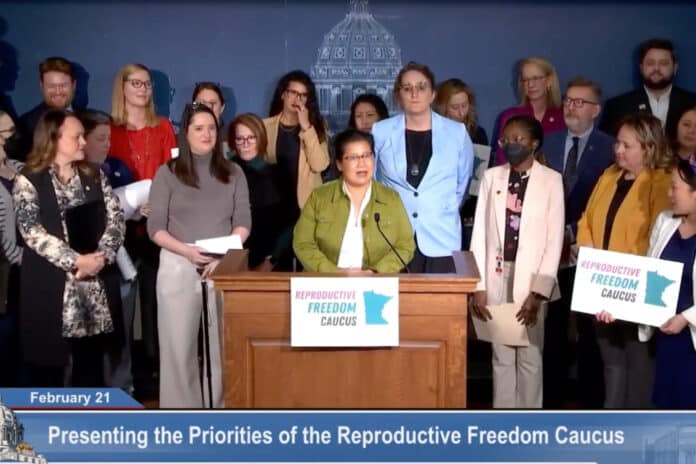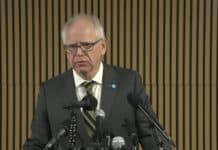
A group of Democrats in the Minnesota Legislature known as the “Reproductive Freedom Caucus” held a press conference Wednesday to discuss their priorities for 2024. A central talking point of their press conference was their support for the so-called Equal Rights Amendment (ERA).
With support throughout the Democratic majorities in the Minnesota House and Minnesota Senate, the ERA has been a top priority for many politicians in recent years. In 2024, the ERA may be approved by the legislature and placed on the ballot for consideration by the public. Currently, the proposed amendment to Minnesota’s constitution reads:
“All persons shall be guaranteed equal rights under the laws of this state. The state shall not discriminate against any person in intent or effect on account of race, color, national origin, ancestry, disability, or sex, including but not limited to pregnancy, pregnancy outcomes and reproductive freedom, gender identity, gender expression, or sexual orientation.”
With a simple majority vote by the Minnesota House and Minnesota Senate, this version of the ERA could be placed on the ballot to be voted on by the whole state in the 2026 election. If approved by voters, the ERA would become a part of Minnesota’s constitution.
Key to understanding the wide-reaching consequences of the ERA is the beginning of the second sentence: “The state shall not discriminate against any person in intent or effect.”
“The language is likely meant to impose the ‘disparate impact theory’ of discrimination on the amendment,” said Maggee Hangge, a policy associate with the Minnesota Catholic Conference. Under the proposed ERA, “if a law or policy has an adverse or ‘disparate’ impact on a particular group of people, it could be considered discriminatory even if the action in question is neutral on its face, meaning there was no real intent to discriminate.”
Hangge added, “Requiring courts to consider disparate impact, and not just intent to discriminate, will have wide ranging effects on how courts handle legal claims.”
At Wednesday’s press conference, members of the Reproductive Freedom Caucus stressed their support for the ERA. Rep. Leigh Finke, D-St. Paul, said the ERA would “constitutionally protect the rights of women, the right to reproductive freedom, the right to gender-affirming care, and the rights of intersex individuals. It will be comprehensive, inclusive, and declare Minnesota as a place that all communities will have the respect they deserve and the rights that they demand.”
However, the ERA conspicuously does not include any protections for religious liberty or people of faith. Given this, Hangge noted that passage of the ERA would mean “Minnesotans will have fewer protections against religious discrimination, and discrimination claims against persons of faith related to sexual orientation, gender identity, or gender expression may prevail over religious liberty defenses in state court.”
Sen. Alice Mann, D-Edina, a member of the Reproductive Freedom Caucus, used the press conference to talk about other measures Democrats will use to to further expand abortion in Minnesota. Specifically, Sen. Mann said she has introduced the “Abortion Coverage Act.” This bill, SF 3967, would “require that health plans cover abortion care.”
In defending her legislation, Sen. Mann claimed that “abortion services” are just a part of prenatal care, maternity care, and primary care.
In 2023, Democrats in control of state government legalized abortion through all nine months of pregnancy. Approval of the proposed ERA would effectively create a constitutional right to abortion in the state of Minnesota.
A previous version of the ERA, which did not include references to “intent,” “effect,” “reproductive freedom,” or “pregnancy,” was passed by the Minnesota Senate last year. Supported by some Republicans, the previous version included protections for religious liberty and passed by a vote of 43-23 in the Minnesota Senate. However, the bill was not passed in the Minnesota House.
Despite their slim majorities in the Minnesota Legislature, the author of the ERA in the Minnesota House, Rep. Kaohly Her, D-St. Paul, said Democrats have a plan to advance the ERA this session. However, they may alter the exact language of the bill as the legislative session progresses.
“All people of faith and those who are concerned about genuine pluralism related to these issues should be concerned by this ERA,” Hangge warned.










